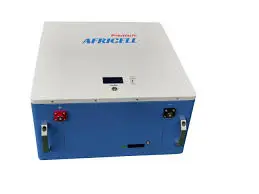1. General Specifications
- Brand: Africell
- Battery Type: Lithium-Ion (LiFePO4 – Lithium Iron Phosphate)
- Energy Capacity: 5kWh (Kilowatt-hour)
- Nominal Voltage: 48V (Volt)
- Nominal Capacity: Approx. 100Ah (Ampere-hour)
- Cycle Life: 4000–6000 cycles (at 80% Depth of Discharge, DoD)
- Weight: Typically around 40–55 kg
- Dimensions: Varies, but usually around 450mm x 500mm x 180mm
- Charge Voltage: 54V – 56V
- Discharge Cut-off Voltage: Around 42V
- Maximum Charging Current: 50A – 100A (Depends on Model)
- Maximum Discharge Current: 100A – 150A (Depends on Model)
- Communication Protocols: RS485 / CAN / RS232 (For BMS Communication)
- Mounting Type: Rack-mounted or Wall-mounted
- Operating Temperature:
- Charging: 0°C to 50°C
- Discharging: -20°C to 55°C
- Protection Level: IP20 – IP55 (Varies by model)
- Warranty: Typically 5–10 years
2. Key Features & Explanation
a. Energy Storage Capacity
- The 5kWh capacity means that this battery can supply 5,000 watts (5kW) for one hour or 2.5kW for two hours.
- Suitable for home energy storage, solar systems, and backup power.
b. Voltage & Compatibility
- 48V system is standard for solar inverters, telecom towers, and off-grid systems.
- Compatible with most hybrid inverters and solar charge controllers.
c. Battery Chemistry (LiFePO4)
- Safer & Longer Life than traditional Lead-Acid or other Lithium-Ion chemistries.
- Deep Discharge Capability (up to 80-90% usable capacity per cycle).
- High Efficiency (~95-98%) with low energy loss during charging/discharging.
d. Cycle Life & Longevity
- 4000–6000 cycles means a lifespan of 10+ years under normal usage.
- Compared to Lead-Acid (which lasts 500-1000 cycles), this battery lasts significantly longer.
e. Battery Management System (BMS)
- BMS Protection: Prevents overcharging, over-discharging, overheating, and short circuits.
- Communication Support: RS485 / CAN / RS232 for monitoring via inverter systems.
f. Charging & Discharging
- Can be charged with solar panels, inverters, or grid power.
- Fast charging capability compared to lead-acid alternatives.
- High discharge current allows running heavy loads like pumps, fridges, and power tools.
g. Installation & Maintenance
- Compact & Lightweight compared to Lead-Acid batteries.
- Wall-Mounted or Rack-Mounted design for easy installation.
- No maintenance required (unlike lead-acid batteries which need water refilling).
3. Applications
Solar Energy Storage – Stores solar power for use at night.
Backup Power (UPS/Inverter Systems) – Provides power during grid outages.
Telecom & IT Systems – Powers telecom towers and data centers.
Electric Vehicles (EV) & Golf Carts – Used in mobility applications.
Industrial & Commercial Use – Supports energy demands in businesses.
4. Advantages Over Lead-Acid Batteries
| Feature | Lithium-Ion (LiFePO4) | Lead-Acid |
|---|---|---|
| Cycle Life | 4000–6000 cycles | 500–1000 cycles |
| Depth of Discharge (DoD) | 80–90% | 50% max |
| Efficiency | 95–98% | 70–80% |
| Weight | Lighter (~40kg) | Heavier (~80kg) |
| Maintenance | No maintenance | Needs water refilling |
| Charging Speed | 2–4 hours | 8–12 hours |
| Safety | No risk of leakage | Risk of acid spillage |
5. Conclusion
The Africell 5kWh 48V Lithium-Ion Battery is an excellent energy storage solution for solar systems, backup power, and telecom applications. It offers long lifespan, high efficiency, and low maintenance, making it a superior alternative to lead-acid batteries.


